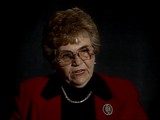<< Previous | Displaying results 2191-2200 of 6707 for "" | Next >>
-
Steven Springfield describes conditions in the Stutthof concentration camp
Oral HistoryThe Germans occupied Riga in 1941, and confined the Jews to a ghetto. In late 1941, at least 25,000 Jews from the ghetto were massacred at the Rumbula forest, near Riga. Steven and his brother were sent to a small ghetto for able-bodied men. In 1943 Steven was deported to the Kaiserwald camp and sent to a nearby work camp. In 1944 he was transferred to Stutthof and forced to work in a shipbuilding firm. In 1945, Steven and his brother survived a death march and were liberated by Soviet forces.
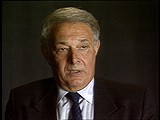
-
Judith Meisel describes arrival at the Stutthof camp
Oral HistoryUpon her father's death, Judith and her family moved to Kovno. Soon, they were confined to the ghetto, which the Germans formed in 1941. Judith, her mother and sister were deported to Stutthof, where her mother died. Judith and her sister escaped from a death march out of Stutthof. They posed as non-Jews, found farm work and eventual refuge in Denmark. Their brother survived Dachau.
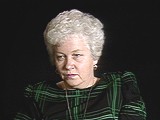
-
Leo Kutner describes forced labor in Stutthof
Oral HistoryLeo was arrested on the first day of the war, and assigned to forced labor in a shipyard, then on a farm. In 1940, like other Jews, he was deported to Stutthof. There, he upholstered furniture for the SS. The following year, he was sent to Auschwitz, where he cleaned the streets and dug ditches. As the Allies neared, Leo was evacuated to a series of camps. On a death march from Flossenbürg, the Nazis dispersed, allowing Leo and other prisoners to get away. He was liberated by US forces in April 1945.
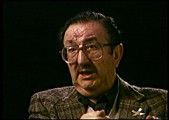
-
Henny Fletcher Aronsen describes the importance she attached to the role of cleanliness in surviving forced labor at Stutthof
Oral HistoryHenny was born into an upper-middle-class Jewish family in Kovno, Lithuania. She and her brother attended private schools. In June 1940 the Soviets occupied Lithuania, but little seemed to change until the German invasion in June 1941. The Germans sealed off a ghetto in Kovno in August 1941. Henny and her family were forced to move into the ghetto. Henny married in the ghetto in November 1943; her dowry was a pound of sugar. She survived several roundups during which some of her friends and family were…
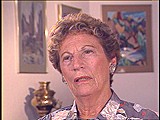
-
Rochelle Blackman Slivka describes a death march from Stutthof
Oral HistoryThe Germans occupied Vilna in June 1941. In October, Rochelle and her family were confined to the Vilna ghetto, where her mother died. Her father, a Jewish council member, was killed in a camp in Estonia. When the ghetto was liquidated in 1943, Rochelle and her sister were deported--first to the Kaiserwald camp in Latvia and later to Stutthof, near Danzig. In 1945, on the sixth week of a death march that forced the sisters to protect their bare feet with rags, the Soviet army liberated them.
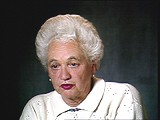
-
Harold Herbst describes meeting a prisoner on the verge of death (known as a "Muselmann") in Buchenwald
Oral HistoryAfter studying medicine at Wayne State University in Michigan, Harold joined the army in 1942. He was attached to the 107th Evacuation Hospital. The unit trained in Belfast, Northern Ireland, and then tracked the US First Army after the June 1944 Normandy invasion. Harold was attached to the US Third Army under George S. Patton in December. He went to Buchenwald shortly after the SS guards fled the camp in April 1945.
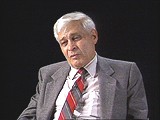
-
Benjamin (Beryl) Ferencz describes collecting evidence
Oral HistoryBen was born in a small village in the Carpathian Mountains of Transylvania in Romania. When he was an infant, his family moved to the United States. Ben attended Harvard University, where he studied criminal law. Ben graduated from Harvard University Law School in 1943. He joined a US anti-aircraft artillery battalion that was training in preparation for an Allied invasion of western Europe. At the end of World War II in Europe, Ben was transferred to the war crimes investigation branch of the US Army. He…

-
Ruth Meyerowitz describes deportation to and conditions in Ravensbrück
Oral HistoryIn Frankfurt, Ruth's family faced intensifying anti-Jewish measures; her father's business was taken over and Ruth's Jewish school was closed. In April 1943, Ruth and her family were deported to Auschwitz. Ruth was forced to work on road repairs. She also worked in the "Kanada" unit, sorting possessions brought into the camp. In November 1944, Ruth was transferred to the Ravensbrueck camp system, in Germany. She was liberated in May 1945, during a death march from the Malchow camp.
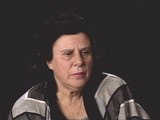
-
Blanka Rothschild describes conditions in the Ravensbrück camp
Oral HistoryBlanka was an only child in a close-knit family in Lodz, Poland. Her father died in 1937. After the German invasion of Poland, Blanka and her mother remained in Lodz with Blanka's grandmother, who was unable to travel. Along with other relatives, they were forced into the Lodz ghetto in 1940. There, Blanka worked in a bakery. She and her mother later worked in a hospital in the Lodz ghetto, where they remained until late 1944 when they were deported to the Ravensbrueck camp in Germany. From Ravensbrueck,…
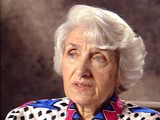
-
Doris Greenberg describes conditions in Ravensbrück
Oral HistoryThe Germans invaded Poland in 1939 and established a ghetto in Warsaw in 1940. After her parents were deported, Doris hid with her sister and other relatives. Doris's sister and an uncle were killed, and she learned that her parents had been killed. Her grandmother committed suicide. Doris was smuggled out of the ghetto and lived as a non-Jewish maid and cook, but was ultimately deported to the Ravensbrück camp. Upon arrival there, Doris and her friend Pepi contemplated swallowing poison, but decided…
